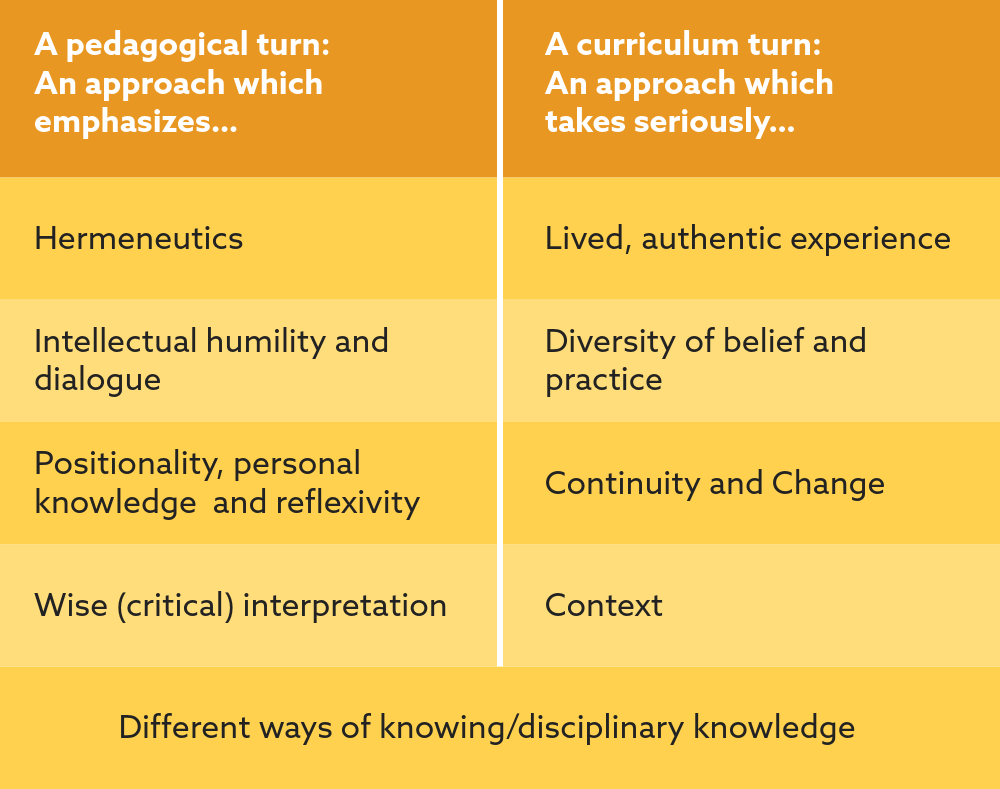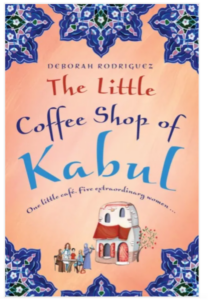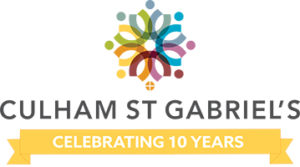Thinking time is extremely valuable. One of the reasons I’ve enjoyed travelling again post-Covid pandemic, particularly by train, is that it gives me thinking and reading time. One of the key themes which has exercised my mind over the last 12 months is a ‘religion and worldviews approach’. I thought I’d write a short reflective piece about how I see things in relation to this as we approach the end of this academic year.
Thought One: Clarifying a religion and worldviews approach
I’ve noticed in the last year that some commentators have been contracting the new approach proposed in the Commission on RE (2018) and subsequent publications such as the RE Council Draft Resource (2022) from ‘religion and worldviews’ to just ‘worldviews’. I think we need to reclaim the phrase ‘religion and worldviews approach’
Key to a ‘religion and worldviews approach’ is the study of religion. Exploring religion as a concept; the nature of religion itself. Alongside this, contrasting the concept of religion with, for example, the concept of worldview, or spirituality or a belief system, examining the different ways in which these complex categories are understood and interpreted. Using examples from religions to exemplify and illustrate. This is an important element of a religion and worldviews approach and seems to have got a little missed in discourse over the last 12 months. The emphasis has been on the following two aspects:
- Increasing the diversity of content within religious worldview traditions
- Including content about non-religious worldviews
These two important elements focus rightly on diversity of religious and non-religious worldviews as content. However, content is only one aspect of this new approach as I will explain below. An emphasis on these two aspects misses some of the key points about a shift towards religion and worldviews.
Over the last few months I have also become more self-aware in relation to my own reflections. I have acknowledged to myself (and to others) that I personally sit within a world religions paradigm, this is what I have grown up with. My initial understanding of a religion and worldviews approach was focused more on how we frame content to the expense of other aspects of the new paradigm. It was revisiting my own doctoral thesis focusing on pedagogy that helped me to see this more clearly.
Thought Two: Balancing pedagogical and curriculum changes
So, my understanding of the shifting paradigm is that it has both a pedagogical and curriculum turn. This is why I think to call it a religion and worldviews approach is appropriate. If we were to call it simply a hermeneutical approach (which some have suggested) I think this loses the curricular turn that is required. If we are simply to call it ‘religion and worldviews’ without the word ‘approach’, then I think we lose the pedagogical turn. Therefore, I think calling it a religion and worldviews approach is helpful.
In pedagogical terms, my understanding is that a religion and worldviews approach focuses on:
- A hermeneutical approach; a focus on learning as an interpretative endeavour
- Intellectual humility and dialogic approaches
- Reflexivity; examining one’s own beliefs, attitudes, motives and reactions.
- Wise, critical interpretation; importance of epistemic literacy
- Acknowledging intentionally the place of personal knowledge/positionality
CoRE References par 2, 6, 7, 12, 23-27
CoRE References, page 4 what is a worldview?
This means building on the work of people such as Bob Jackson, and more recently Martha Shaw. Shaw talks about interpretability, reflexivity and transformational encounter as the key foci for a religion and worldviews approach. My own PhD thesis (2018) puts forward a very similar approach to pedagogy.
In curriculum terms, a religion and worldviews approach takes seriously:
- Lived authentic experience of religious and non-religious worldviews; a focus on and beginning with people
- Diversity of belief and practice; divergence within and between organised worldview traditions
- Understanding of conceptual categories e.g religion, worldview, spirituality
- Continuity and change within religious and non-religious worldview traditions
- Context within which religious and non-religious worldview traditions are shaped and practiced
- Different ways of knowing (disciplinarity) e.g theological, philosophical, historical, social science (connected to epistemic literacy)
CoRE references paragraphs 9, 10,11, 12, 13, 30-37, 45
CoRE references, pages 12-13 National Entitlement Statement, pages 72-77 Appendix 2
In many ways the substantive content has already changed over the last 5-10 years. Non-religious worldviews have been included for many years, and more recently increasing awareness of diversity within organised worldview traditions has been recognised. However, a worldviews approach calls for a different framing of this content. This is where the work of David Lewin and his team may be helpful. The focus in David’s work is on exemplar content being chosen for educational purposes. Exemplars are chosen to illustrate a larger principle or idea. A teacher chooses an exemplar to ‘open up the child to the world’. This moves away from the notion of ‘coverage’ of world religions, to a new way of framing content. The work of Jan McGuire and Barnet SACRE using the work of Ann Taves may also be very useful here. In our Culham St Gabriel’s subject knowledge courses, we tentatively suggest a people, places, actions as a possible framing for substantive content, with disciplinary questions framing the organisation of this content. This is quite different to previous ways of framing the curriculum.
In many ways this disciplinary framing sits underneath the pedagogical and curriculum turn, as foundations for both aspects. I’ve summarised this in the following table:

Thought Three: A religion and worldviews approach aligns well with promoting Freedom of Religion or Belief (FoRB)
In the last year I have spent much time considering FoRB and education. I’ve had the privilege of working with teachers and consultants to explore how we can promote and protect FoRB with primary age children. At its core, a religion and worldviews approach centres around how religious and non-religious people encounter, interpret, understand and engage with the world. This approach is comfortable with ideas of pluralism, better reflecting the complex societies in which individuals live and therefore more likely to be able to provide “positive and accurate information about different faith and belief communities”. In addition, the approach places emphasis on responsible hermeneutics, intellectual humility and wise interpretation supporting a pedagogy which aligns well with FoRB principles. Furthermore, a religion and worldviews approach, is well placed to be able to emphasize “the benefits of pluralism and the importance of human rights, including freedom of religion or belief”. Consequently, the global network of scholars and educators working on developing new approaches to the teaching of religion and belief are well placed to be partners for the promotion and protection of FoRB in schools. This aspect to me is an important consideration going forward as we contemplate pedagogy and curricula in schools.
A final thought
So I believe we need to keep on thinking. I know my thoughts change and shift; yet over the last year I think I have more clarity in my own thinking. We need to be open to one another, to listen, to learn, to reflect. This has been the joy of in-person gatherings this year. Perhaps the summer holidays provide some time for refreshment, renewal and further thinking…
References:
https://www.commissiononre.org.uk/
Details of grant funded projects mentioned can be found here



